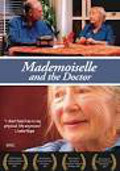
Directed by
Janine Hosking
86 minutes
Rated M
Reviewed by
Bernard Hemingway

Mademoiselle And The Doctor
Synopsis: A documentary focusing on the interconnecting stories of a healthy and apparently well-adjusted 79 year old woman, Mademoiselle Nigot, who is planning to commit suicide before she turns 80 and the man whose advice she enlists in order to do so, Dr Philip Nitschke.Janine Hosking's documentary is not likely to join the ranks of crowd-pleasers like Super-Size Me. Not because of its subject, euthanasia, or assisted suicide, so much as the fact that it lacks familiar entertainment values and demands concentrated attention. Its two main stories, that of French-born former academic Lisette Nigot, who is planning to commit suicide, and euthanasia crusader Philip Nitschke, are told without verbal or visual flourish. Hosking is heard asking questions intermittently but for the most part, and particularly in Nitschke's case, the camera observes them as they go about their business and it is left to the audience to draw their own conclusions about the motives behind and implications of that business. This strategy of leaving its core ethical questions largely unaddressed or addressed obliquely is an interesting but not entirely commendable one.
Hosking chooses the device of contrasting a sane and healthy 79 year old who has decided, sans regrettes, to kill herself before her 80th birthday with the efforts of Nitschke to assist people suffering from physically and psychologically corrosive terminal illnesses to end their own lives. This is, however, not a straightforward opposition and, of course, the observational mode to which the documentary adheres masks a raft of moral choices, or equally, fails to canvas such.
Thus, strictly speaking, Mlle Nigot's act is one of evidently philosophically-inspired and culturally-determined (France has just recognised a right to die without formally ratifying euthanasia) suicide, and need not be "assisted". Hosking memorably opposes to her case that of a cadaverous 66 year-old dying of stomach cancer in a Broken Hill hospital. Visually this is a stunning statement in favour of Nitschke's case. It is, however, a picture that does not replace a thousand words. The footage is from eight years previously, covers only the last couple of days of the patient's life and makes no comment on the quality of patient care, which is evidently fairly rudimentary, or the patient's wider circumstances.
It is in its failure to present the other side of the coin (or, to use another metaphor, to look at a bigger picture) that the documentary falls down. Assisted suicide, a subject which is of increasing relevance in our aging (and age-ist) society is a complex moral issue and Ms Hosking presents a simplistic account of it with no consideration of the medico-legal questions involved and with a considerable unstated spin in its favour. Whilst it is the viewer's responsibility to deconstruct this tendentiousness, particularly with a subject of this nature, that lies well beyond most viewers' experience, it is also the film-maker's responsibility, whatever material constraints there may have been, if not to present counter-arguments, then to come out from the behind the camera and question the limitations of her competence. That she does not reduces the value of her work significantly.

Want more about this film?


Want something different?




